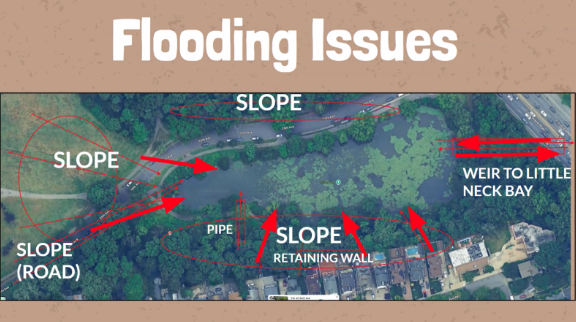
BY T’NEIL GOODEN
Community Board 11, which represents areas of Northeast Queens, convened on Nov. 5 to consider the history of flooding at Crocheron Park, located in Bayside, just a few feet from the Cross Island Parkway, and review a plan to preserve the pond within the parkland.
Reporting on the history of flooding in Crocheron Park, Emi McKinney, a senior at Bronx High School for the Sciences, worked with a retired Department of Environmental Protection and a retired Parks employee, to not only test the pond but also survey the rising water levels due to increased rainfall over seven weeks in the summer of 2025.
McKinney tested the water within the park and found that the water quality was inadequate, leaving the pond at risk of being filled with damaging substances. “Harmful algae blooms thrive in warm temperatures and low turbidity levels that allow more sunlight to penetrate the water and excess nutrients,” said McKinney. McKinney found that the pond will produce harmful algae blooms if it is not fixed in the near future.
Crocheron Park is surrounded by hills and slopes, which lead to flooding and higher water levels in the pond. “The pond just kind of floods every time there’s heavy rain,” said McKinney.
Dana Gumb, a retired Department of Environmental Protection (DEP) employee with over 33 years’ experience, explained that the flooding of the parkland has gotten to a point that is not normal for the area.
“There are flows of water coming from 35th Avenue like we have never seen before. I’ve lived in Bayside for 34 years,” he said. “I’ve never seen water flowing here like it now routinely flows.”
Gumb continued, “We’re getting like half a month’s worth of rainfall in several hours. I think it’s a new condition, you know, within the last several years.”
Due to flooding, the pond has filled with sediments from mudslides in addition to the routine rainfall in the northeast Queens parkland.
“The sediment has accumulated over many years, since 1969,” said Mike Feller, retired chief naturalist at NYC Parks. “This is typically what happens to ponds. They fill up, and they become a wet meadow, and then they become some kind of wetland. There’s no pond anymore if somebody doesn’t intervene and dredge them out.”
The pond within the park is an important part of the flooding mitigation system for the Cross Island Parkway; however, the flooding is causing it to be “a less effective part of the system, which basically creates an overflow,” McKinney said, which will cause flooding on the Parkway.
McKinney then explained that the pond’s future could be preserved in multiple ways, like “stabilizing and loosening sediment on the surrounding slope to stop the mudslides,” she said.
Committee members followed McKinney’s recommendation by suggesting that the Queens state legislators could help. “[Edward C.] Braunstein and John Liu, could offer some suggestions for help on this particular issue,” said Henry Euler, the first Vice Chair of the Environmental Committee, as an earlier discussion with DEP was not looking promising.
Joseph Marzilliano, the District Manager of Community Board 11, spoke with DEP early in the day about the flooding that occurred on July 31, 2025, on Little Neck Parkway, Bell Boulevard, Cross Island Parkway, and Clearview Expressway, as well as the weeks that followed, weeks marked by torrential rainstorms. Marzilliano wanted to speak with the DEP on August 4, 2025, but only met with the DEP on November 5, 2025.
“They [DEP] gave us a short and frankly not impressive presentation considering it’s been months and months and months,” he said. “What they’ve done in our district it’s a big fat nothing, frankly.”
DEP addressed the flooding that has occurred in the northeast areas, but they have only focused on the Little Neck Parkway, leaving the Cross Island Parkway and other areas of Queens to fend for themselves.
“It was a very underwhelming presentation from them [DEP],” Marzilliano said. The meeting was called back in August, as that was the budgeting month for the District; however, DEP took too long, and the budget season ended. “They never told us what forms of infrastructure we should be advocating for in the capital projects. So now that gets put off by a year,” he said.
Within that year, DEP will create a 10-year capital project plan to solve this flooding issue and provide capital investments on comprehensive infrastructure planning efforts across all neighborhoods.
